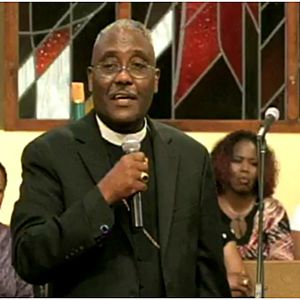J. Delano Ellis facts for kids
Quick facts for kids The Most Reverend Jesse Delano Ellis, II |
|
|---|---|
| Metropolitan Archbishop of the Joint College of Bishops, Presiding Prelate of the Pentecostal Churches of Christ, and Senior Pastor of the Pentecostal Church of Christ (Cleveland, Ohio) | |
 |
|
| Church | Pentecostal Churches of Christ |
| See | Pentecostal Church of Christ |
| Orders | |
| Ordination | 1963 |
| Consecration | 1970 by Brumfield Johnson |
| Personal details | |
| Birth name | Jesse Delano Ellis |
| Born | December 11, 1944 Philadelphia, Pennsylvania, U.S. |
| Died | September 19, 2020 (aged 75) Cleveland, Ohio, U.S. |
| Residence | Cleveland, Ohio, U.S. |
| Children | 6 |
| Occupation | Pastor, author |
| Education |
|
| Coat of arms |  |
Jesse Delano Ellis, II, often known as J. Delano Ellis, was an American Christian leader. He lived from December 11, 1944, to September 19, 2020. He was important for bringing different Pentecostal groups together. These groups included both Trinitarian and nontrinitarian beliefs.
Ellis started and led the Joint College of Bishops as their main leader. He also founded the United Pentecostal Churches of Christ (now called the United Covenant Churches of Christ) and the Pentecostal Churches of Christ. He was the senior pastor of the Pentecostal Church of Christ in Cleveland, Ohio, starting in 1989.
J. Delano Ellis and his co-founders helped change African American Pentecostalism. They brought more organized worship styles and traditions to these churches. Ellis also worked to connect Pentecostalism with other Christian groups around the world.
Contents
About J. Delano Ellis
His Early Life
J. Delano Ellis, II was born to Lucy and Jesse Delano Ellis, Sr. His mother became pregnant with him when she was very young. His mother was a Christian. His father followed other religions like the Moorish Science Temple of America and the Nation of Islam.
When Ellis was a child, his mother had to go to a mental health hospital. He then lived with his grandmother and great aunt. As a teenager, he tried to connect with his father. He went to a Nation of Islam mosque with him. His father told him that Christianity was not for Black people.
Later, Ellis joined the United States Air Force. He also attended the Church of the Nazarene. Because of racial segregation at the time, he joined the Christian Methodist Episcopal Church. There, he learned to appreciate more formal church services and traditions. He later returned to the Church of God in Christ.
Becoming a Church Leader
In 1963, Ellis became an ordained minister. He was ordained by Bishop Ozro Thurston Jones, Sr. of the Church of God in Christ. In 1970, he became a bishop. This was done by Bishop Brumfield Johnson of the United Holy Church of America.
While in the Church of God in Christ, Ellis helped create the Adjutant's Corp. This group helped bishops and other leaders. He became the third Chief Adjutant for this national group.
In 1989, Ellis was asked to lead a church that believed in Oneness Pentecostalism. This was different from the Church of God in Christ. He thought that Oneness Pentecostalism and Trinitarianism were not completely different. However, he later believed the Bible did not fully support the idea of the Trinity. Soon after, he started the United Pentecostal Churches of Christ.
The Joint College of Bishops
While leading the United Pentecostal Churches of Christ, Ellis helped start the Joint College of African-American Pentecostal Bishops. This group is often called the Joint College of Bishops (JCOB). It was founded in November 1993. Ellis started it with Wilbert Sterling McKinley, Roy Edward Brown, and Paul S. Morton.
The Joint College of Bishops began as a group for Pentecostal churches with more formal worship styles. It later included other Protestant churches. Members of the Joint College of Bishops began using traditional church clothing. They also taught about the meaning of these clothes. For example, they taught that the chimere (a type of robe) was a special garment. This robe was originally part of academic clothing before bishops started wearing it. Leaders in the Joint College of Bishops also taught about different church ministries and the ordination of women.
During some disagreements about Christian beliefs, Ellis and the college spoke out against Carlton Pearson. Pearson believed that everyone would eventually be saved. Ellis and the college said this belief was wrong.
Apostolic Succession
In his book, The Bishopric – A Handbook on Creating Episcopacy in the African-American Pentecostal Church, Ellis wrote about his church's connection to past Christian leaders. This connection is called "apostolic succession." He said his church had connections to both "western" and "eastern" Christian traditions.
He claimed "western" connections through the Church of England, John Wesley, and the Methodist Episcopal Church. He also mentioned the Church of God in Christ. He said some Church of God in Christ bishops had connections to the Methodist Episcopal Church.
Ellis also noted that he was ordained in 1964 by Bishop Ozro Thurston Jones. He was made a bishop in 1970 by Bishop Brumfield Johnson.
He traced "eastern" connections through the Syro-Chaldean Church. This was through Archbishop Bertram S. Schlossberg. In 1995, Ellis said his church joined with Schlossberg's church.
Some Christian leaders, like Michael Ramsey, who was once the Archbishop of Canterbury, believe that apostolic succession means a continuous line of teaching, preaching, and leadership. In Catholic theology, apostolic succession gives leaders the power to perform most sacraments. However, some Anglican and Catholic thinkers have questioned Ellis's claims. This is because his predecessors were Trinitarian, while Ellis was Oneness Pentecostal.

